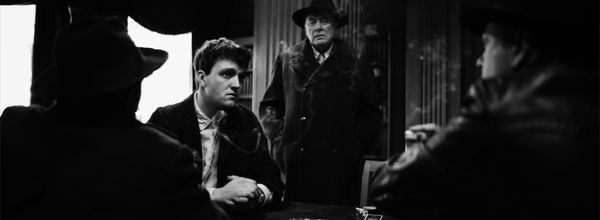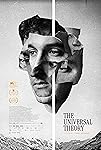Eye For Film >> Movies >> The Universal Theory (2023) Film Review
The Universal Theory
Reviewed by: Amber Wilkinson

Multiverses have become a box office staple lately, courtesy of Marvel and the like, but they are rarely as elegantly mounted as this retro and twisty little mystery from Timm Kröger. Forget separating fact from fiction in his lush black-and-white noir-inflected drama, here the possibilities of multiple facts and existences swirl within a story which, within the world of the film, has been marketed as fiction though the author Johannes (Jan Bülow) insists it is nothing but the truth.
Johannes appears to assert this in a prologue, on a Seventies talks show, Roland Stuprich’s colour cinematography as perfectly evoking the period as he will conjure up the early Sixties in full-blooded monochrome expressionist style. Soon we’re spinning back to the Swiss Alps in 1962, where Johannes - then a young physics doctoral student - has headed with his starchy supervising professor Dr Strathen (Hanns Zischler). We are enveloped within his story, and his struggle to make Strathen accept his thesis, as strange events start to rock what he previously assumed was his solid world.

First, the Iranian keynote speaker doesn’t show up but Johannes scarcely has time to think about that since he finds himself drawn to a former colleague of Strathen’s Professor Blumberg (Gottfried Breitfuss). Blumberg may be downing wine like it’s going out of fashion but he’s also willing to encourage Johannes’ more radical postulations. Being pulled between multiple forces is part of the point here, especially after Johannes meets enigmatic pianist Karin (Olivia Ross). An almost mirage-like femme fatale, she knows things about him that she shouldn’t. There’s also mysterious happenings in the mountains, which allow for some retro-style special effects that are a reminder of how much can be achieved with clever application of light and dark. Lurking in the background, with the possibility of other universes, are murders and the spectre of Germany’s Nazi past. As Johannes is pulled in further into the knotty question of who he, and everyone else, is, there’s a melancholy note to a film which suggests living your life might well be more advisable than theorising about it.
The Universal Theory deliberately evokes the likes of Hitchock - particularly via the scoring from Diego Ramos Rodriguez and David Schweighart, who go so far as to give Karin a theme of her own - but there’s also more than a whisper of Lynch. It also recalls any number of older science-fiction movies and, as if that wasn’t enough, even includes a French nouvelle vague nod. Kröger, writing with Roderick Warich, favours atmosphere over explanation, but with visuals like this, it’s hard to argue with him. While the snowy coolness extends to the film’s emotional heft, those who like to engage their brain with cinema rather than their heart, will find plenty to think about.
Reviewed on: 26 Dec 2024















